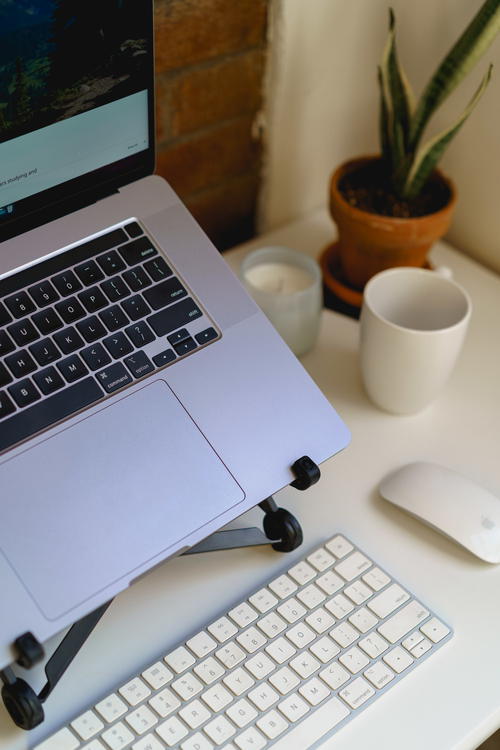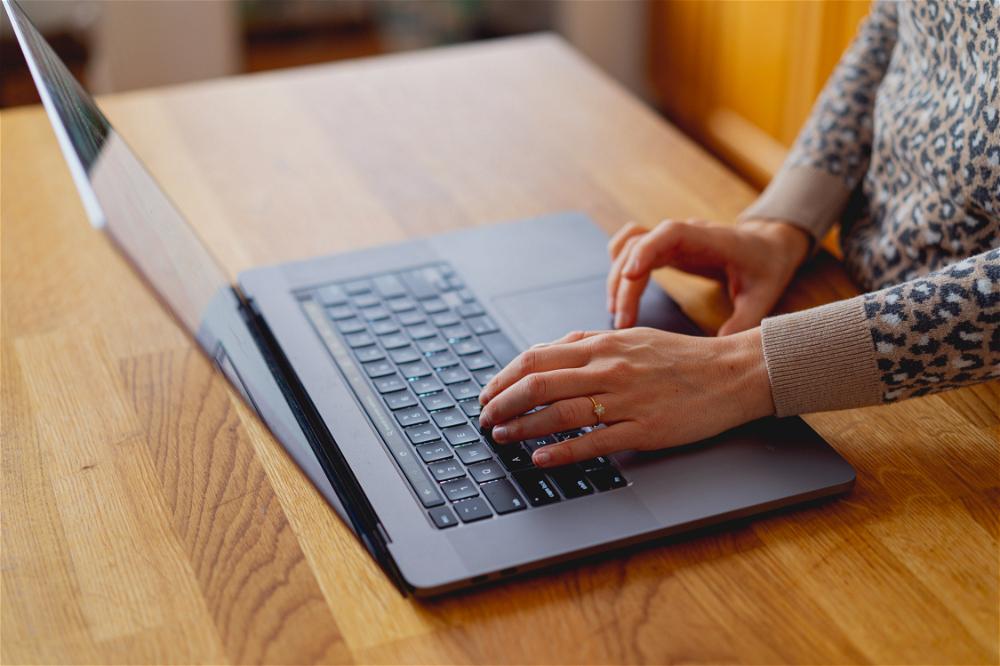How to Prevent Work from Home Burnout

Let’s talk about how to avoid burnout while working from home or working remotely. With these tips for working remotely from home, we share how tips for productivity and staying positive.
This article may contain affiliate links. We earn a small commissions when you purchase via those links — and it's free for you. It's only us (Becca & Dan) working on this website, so we value your support! Read our privacy policy and learn more about us.
Table of contents
- Get up for a walk
- Take breaks
- Take a day off here and there
- Make yourself a rewards system
- Find a remote work accountability buddy
- Turn your breaks into relaxation
- Schedule time to cook
- Use yoga to free your mind throughout the day
- Don’t forget about your vacation time. Even if you have to stay home, get your mind off work
- Be honest about if something “can wait until tomorrow”
- Stop working on weekends!
- Prioritize your relationship between wellness and eating right
- Find time every day to work out — seriously
- Avoid using medicines as crutches
- Remember that you are human, not some type of superhero
- Stay connected socially and make time for human interaction
- Plan a trip or dream about travel
Is burnout only applicable to working in an office?
Definitely not.
If you’re someone who works from home or works remotely, you could be experiencing the same type of burnout symptoms as someone who works in a traditional office setting.
Let’s take a step back for a moment, as this may seem overwhelming, and I hope you’re doing OK if you’ve found yourself Googling “remote work burnout.” We’re here right now to tackle burnout, to regain energy and to lessen stress and anxiety.
This list is not at all a “how-to” article for how to figure out if you’re burned out or nearing professional burnout, but rather, how to prevent remote work burnout with some ideas.
What does work burnout feel like?
It’s different for everyone. I’m no doctor, and I’m certainly not a psychologist, but I’ve experienced burnout from my job in the past.
It feels like going to work is more than a chore — it’s almost painful. Burnout feels like having no energy left at the end of the day to help do the things that actually help you unwind from the work you did, all day.
What does burnout feel like when you work from home?
It could be the emotions you experience when you open your laptop for the day because you haven’t slept well the night before, because of work. You could feel like you can’t get away from work, despite the fact that you work at home.
Burnout from working remotely could be too many hours spent behind a screen, or doing too many tasks at once so that you’re forgetting to eat, take care of yourself, rest and enjoy life.
What are the symptoms of remote work burnout?
Symptoms of actual burnout can include (but are not limited to) irritability, loss of sleep, feeling lethargic, feeling unmotivated, anxiety and sometimes, depression.

So, burning out early when transitioning from the office to working from home has become one of the most common mistakes to avoid for remote workers.
People who work in offices can get burned out by waking up at 6 am to commute for two hours, spend eight to nine hours at the office and then spend two more hours commuting home.


Why could remote workers experience burnout?
People who work from home can get burned out because they make their own schedules, get distracted during the day leading to less productivity and may feel isolated, alone or misunderstood.
No one said working from home was easy. The world tends to think that working remotely is something awarded to employees who show their worths, or successful freelancers who own their own businesses, but working from home or remotely can be for just about anyone.
It also comes with a proven list of benefits.
Working from home involves all the demands of work, plus conquering one’s own autonomy and independence. The biggest struggles — or wait, the biggest wins! — can be the parts of the job that are time management, goal-setting and staying motivated.
How to prevent burnout in a few easy steps
If you’re feeling like you’re nearing work-from-home burnout, let’s get talking. We want to share with you the ways in which you can avoid burnout and stay positive while working from home.
Hopefully, a handful of these preventative tactics will work for you, because work-from-home burnout is real. Let’s start with #1.
Get up for a walk
I read recently that some of the greatest writers of all time were inspired by walks they took, or by isolating themselves in nature.
There’s something truly refreshing about seeing green trees, grass, flowers or landscapes, no matter where you live. (And if you live in a desert, maybe you’ll see sand and cacti — that’s okay, too!)
As I write this, I’m inspired by the pines and oaks of Fort Greene Park, Brooklyn, as I sit in a lawn chair on a patch of grass next to a garden.
It sounds idyllic, and it is. It’s helping me remember that there’s life outside my home office.
Even though I’m working hard (on writing this article that you’re reading), the green colors and the wind pacify me and make me forget the confines of my home office that I share with my partner, Dan.
Back to taking walks, though.
Taking a walk is a time when you can get moving and get some steps. Whether you take a walk around the floors of your apartment building for a break, or if you can walk around your block or to a nearby park, this helps create breaks within your work day.

One of our biggest work from home tips is to leave your phone at home.
If everything can wait, then instead, wear an old-fashioned wristwatch to make sure your walk doesn’t exceed 10 or 15 minutes if you have to be back for a meeting.
Walking helps alleviate stress and can help reset your mind toward what motivates you most (which could be finishing your work so that you can take another walk before it gets dark out).
Take breaks
Stamp out work-from-home burnout before you get there by making sure you take breaks. It’s one of the best ways in which you can set a schedule for yourself.
Anyone who works from home is likely guilty of getting sucked into a project, a meeting that went twice as long as expected or finishing jobs for deadlines.
In order to stay on task, stay motivated and stay productive, make sure you freshen up your day with breaks.
What kind of breaks do you like? Do you like to run an errand like going to the post office or supermarket during a break?
Or, do you prefer to not even leave your home office by setting up an online pilates class to get some fitness time?
Both Dan and I like focusing our breaks around food (who doesn’t?), so usually, we take breaks rummaging in the fridge for a healthy snack or some homemade concoction (today it was grapes, an apple with honey and some strawberries — yum).
It seems like burnout could easily happen if you don’t make time for breaks, so set some up, whether mentally or literally in your calendar.
Take a day off here and there
It’s said that Americans have the hardest times taking days off from work.
There’s a running joke that Europeans will put on an auto-reply for three weeks because they’ve gone to the beach and that Americans will apologize for being late to reply to an email because they’re in the ER.
It doesn’t help that work culture has turned a lot of us into people who feel guilty when they ask for time off from work. I’m one of them, and truly honestly never thought I would be.
While your ideal chunk of time off from the job may be a week or a two-week getaway somewhere far away, the fact of the matter is that taking a three- or four-day weekend sometimes even does the trick.
If you’re short on vacation days or if your new job doesn’t want you taking off too shortly after starting, go away for a weekend! Even a 36-hour getaway to Beacon for the weekend got my travel juices flowing and made me feel like I went far away from work.
Prevent burnout by taking mini-trips or mini-vacations, or, there’s always the good old ‘staycation’ where you can stick around your city or region and try things you typically don’t have time to do.
The first step is taking dedicated days off, and raising your spirits while you look forward to time off of any kind.
Work on leaving anxiety at the door with our tips to decreasing stress at a new job in this guide.
Make yourself a rewards system
When people ask how I stay motivated while working from home, I say that I create rewards for myself. Sometimes that’s all it takes to crush working from home for the first time.
For example, if I have 10 emails to work through, I tell myself that no matter how long it takes, I have to get through these emails or I can’t do yoga or start dinner.
And if you know me, I really want to do yoga and start cooking dinner, so I’m putting myself into a box of having to do these things or I can’t proceed with my day-to-day needs.
If that doesn’t work, reward yourself on a weekly basis. Did you hit your sales goals this week, or did you finish a project ahead of time? Did a colleague compliment your dedication?
Reward yourself with tacos from your favorite restaurant, or with an hour-long FaceTime with an old friend. Use a constant system of rewarding yourself to avoid burnout and to introduce positivity into your schedule.
Find a remote work accountability buddy
Having an accountability buddy might sound lame, but if it works for you, that’s all that matters.
Do you know of anyone else in your network in the same type of position as you are, whether that’s someone who’s working from home for the first time, or someone who’s having trouble working with a remote work schedule at home?
Phone a friend (or Slack him or her) and ask to be buddies.
It doesn’t have to be any type of long-distance or long-term relationship, but sometimes all you may need is someone to voice a concern to, or someone who can help keep you on track.
Turn your breaks into relaxation
As mentioned above, we recommend taking breaks to help avoid burnout, but what if your breaks are making you busy? Or even busier?
Dedicate time to meditation, yoga or even napping, if that is what suits your productivity cycles.
Today I went up to our rooftop here in Brooklyn and sat with my eyes closed for only two minutes. It did the trick! This can be a way to relax, avoid stress, lessen anxiety and ‘turn off’ just for a few moments.
What I’ll also do sometimes is go for a little walk outside, maybe only five minutes, but I’ll leave my phone inside. This way, the emails can wait, my calls go to voicemail and I can’t check Slack or Instagram.
It’s only five minutes. You’ll be right back.
Schedule time to cook
If you want to prevent burnout, I wouldn’t say cooking is going to completely reverse you, but it definitely will help. It’s our top tip for eating healthy when you work at home.
Cooking is therapeutic — at least that’s what I learned once I gave in to start learning how to cook in my mid-20s.
For two years, I had lived abroad in China, where eating out was a) incredibly delicious and b) sometimes the same price as a cooked meal purchased from my groceries. I also never invested in good cooking utensils because I preferred socializing over dinner and always having plans, to be constantly networking.
I carried this bad habit (of eating out) into my early 20s when I moved to Manhattan and was once again faced with incredibly delicious food options, all at my fingertips. I was also faced with NYC prices, plus tax, plus tip, and it certainly was not as cost effective as eating at my favorite joints across Shanghai. Live and learn!
Using cooking as a way to “create,” when you work from home, is something enlightening that you can put positive energy into.
If you use Pinterest, or even just the Internet, you may know (if you don’t — start your Googling now!) that the web is full of amazing recipes from chefs and bloggers.
Aside from the heap of recipes that are free for you to use, scheduling the cooking time is what can make your work breaks productive and positive.
If you’re feeling burned out, channel your caffeination or frustration into slicing fruit or vegetables, or using a blender to make an amazing smoothie. What are you waiting for?
Use yoga to free your mind throughout the day
Yoga is the work-at-home fitness method that I’m passionate about.
I used to go to studios in Manhattan and then in Brooklyn to practice yoga, and then I found out that I could also do yoga in classes anywhere from 10 to 60 minutes on YouTube.
If you’re new to at-home fitness, check out our guide to fitness for when you work from home.
In my opinion, yoga creates a challenge, a way to sweat, a way to continually improve and a way to calm down. I used to be stressed at work and then go to yoga on 103rd St. on the Upper West Side, where I’d channel everything that dismayed me into stretching in new ways and trying my best to improve at practicing yoga over time.
As for preventing burnout, yoga is an incredible way to be mindful, learn about your body and relieve stress. If you don’t believe me, AloYoga or Five Parks Yoga with Erin on YouTube. You don’t even have to tell anyone.
What’s a 10-minute yoga session here and there? 10 minutes is almost nothing, when it comes down to being a fraction of your workday.
I’ve started doing 10-minute yoga classes to refresh throughout the day. A specific one I recommend is Yoga with Adriene, as she has put together a 30-day Yoga Challenge, which drops in your inbox around 11am ET each day and you can use the 10-minute class as a break whenever you need a stretch.
Using yoga as a way to give your mind a temporary reset can help you stay sane while working from home. Need a new yoga mat or yoga blocks? We recommend this ultralight yoga mat and these yoga blocks.
Don’t forget about your vacation time. Even if you have to stay home, get your mind off work
Three words: take your vacation, and savor your holidays off from work.
That was a few more words than three, but you get the point!
Having time off from work can be difficult when you work at home, because your home is your office, but remember to leave your home office alone when you don’t have to be at work or working on something like a professional project.
Are you a freelancer? Learn how you can take time off if you manage your own schedule.
Burnout happens when you work too much and too often. If you take your vacation and schedule it in advance, you’ll know when you can get off the grid and adventure somewhere special, whether it’s a corner of your neighborhood park or some place on your wish list like the Dominican Republic.

Be honest about if something “can wait until tomorrow”
One of my downfalls is working on things after dinner or right before bed, telling myself that it really cannot wait another hour.
If you find yourself finishing tasks and projects and you’re not on deadline, ask yourself: “Will this have the same effect if I do it tomorrow at 9 am?”
If the answer is yes, engage in a leisure activity you enjoy (Netflix? a virtual HIIT class? cleaning your kitchen?) and call it quits on work-related things to stop burnout before it happens.
Stop working on weekends!
Do whatever you can to finish your work during the week, if that’s what is expected of you. Of course, if you’re a freelancer trying to hit a Sunday night deadline for a client, then put in those hours during the weekend, but don’t forget to give yourself a day off during the week.
When you work from home, the physical and mental separation between work and life, and life and work, can get really blurred.
If you slide into your desk chair on a Sunday afternoon and you wind up checking work emails and answering clients, remember that you’re also putting yourself in a place where people will expect you to continually answer on weekends.
See how to set up a work from home schedule so that you can separate work from play.
Break the cycle by leaving weekends for “you time,” if that fits within the demands of your career and job requirements.
Prioritize your relationship between wellness and eating right
There’s a lot of linkage between your health and your mind.
Again, we’re no doctors, but we did write this guide to learn how to eat healthy while working from home and it’s been helpful for lots of professionals who are struggling with snacking poorly or skipping meals when working at home.
Your future (yet avoidable!) burnout could be happening from too many hours hunched over the desk with salty chips for snacks instead of carrots, or, you could be skipping dinner and opting for a tray of cookies before you know it.
Get your relationship with yourself and your work together by making sure you consume vitamins, nutrients and fiber to help your mind feel good and to avoid fatigue.
That’s step one!
Find time every day to work out — seriously
Working from home can make you feel lazy if you look at your step count on your iPhone or Google Fit app (one of our favorite apps for travel) and you see 32 steps.
Yuck.
While doing an at-home workout won’t contribute to that step count, toss your phone to the side and work up a sweat or a heart rate with an online workout or a workout in the park.
Working out every day gets your body to do something other than sit in your home office and work, take calls and attend meetings over Zoom.

It’s that important. It should be something you make time for and feel good about, and eventually, you’ll tell yourself that you have to work out or your day is not complete.
The worst feeling would be feeling burned out by work and by being ‘stuck at home,’ and not moving your body at all. So, make yourself a home workout plan and get crackin’!
Avoid using medicines as crutches
While we personally don’t have much experience in prescription medication or a wide array of painkillers (you could say we’re lucky), one thing you definitely don’t want to be doing is contributing to professional burnout by hiding it with medicine.
Take a step back.
Figure out why you feel burned out by work or why your work-from-home lifestyle is contributing to burnout.
Figure out what you could do to solve things. Maybe online therapy could help. Maybe talking to friends more regularly could brighten your day or help create positive vibes.
Whatever you do, avoid curing your burnout through experimentation with medicine, and if you find yourself having any type of addiction or issue, please, please, please seek help from a medical professional.


Remember that you are human, not some type of superhero
We’re all human: me, Dan, you, your colleagues, your friends, your family. No one is perfect.
Instagram may make lots of people look perfect, but if you use your head to see through the setups and highlight reels, it’s clear that not everyone is having ‘the best day ever.’ This applies to work lives as well.
Don’t be too hard on yourself to create perfection, especially if you’re new to working from home and it’s looking like this may be your way of life for a while.
If working from home is what your future holds, check out our list of the ways working from home in the long-term can benefit you.
Accept your faults, work on your struggles to create solutions and give yourself a break. You are the perfect You, and maybe you needed to hear that right now!
Stay connected socially and make time for human interaction
Whether this is in-person or virtual, make socializing a priority.
This is especially important if you work from home and you’re alone (I’d love to say dogs and cats count, but humans are what we’re counting here).
Working from home can make you feel isolated or cut-off. That’s no secret!
Staying connected can help professionals who work from home to connect to their networks, coworkers and friends, before they see them at the annual corporate retreat in person.
It could also be that you need some networking to feel good, and for that, there’s lots of speed networking sessions, virtual happy hours and interactive webinars that can do the trick.
Don’t let burnout make you feel completely alone, because you’re not. Behind every computer screen is a person who enjoys human interaction just as much as you do, and all you have to do is find it!
Plan a trip or dream about travel
Yes, we’re biased (have you seen the destination guides on this website?), but dreaming about going to other places creates a sort of adrenaline and positivity that can’t be beat.
Whether you’re able to take a trip later this year, or next, or even in two years, start dreaming. It’ll give you positive vibes. If you’re planning a trip with a friend, share travel advice or travel destination ideas.
You can even work while you travel. We wrote a guide on how to work remotely and travel. To get a head start, you can check out a program like Remote Year.
On Remote Year, you’ll join a professional community of other travelers who are business owners, web developers, writers, designers, HR professionals and more. You’ll get access to great coworking spaces and places to live while you travel and work through several destinations around the world. Check it out!


If you hope to travel with family, start an email chain to talk about budget, a restaurant list or tour agencies that can get you to landmarks of interest.
Work-from-home burnout is real — very real — for many people, and if you’re feeling down, remember: there is life outside your apartment (we borrowed this quote from the musical Avenue Q) and outside your house, and there’s a world outside your neighborhood.
Remember that if work is giving you anxiety, there are other jobs out there that you can find on a remote job board, and there are indeed very healthy ways to work from home or talk about how you’re feeling.
You may also like
-
![]()
The Difference between Work from Home and Remote Work
What’s the difference between working from home and working remotely? People may use the terms interchangeably, but here’s what to keep in mind when exploring both lifestyles.
-
![]()
How to Create a Daily Work-from-Home Schedule
Adjusting to working from home, and thinking about a work from home schedule template? We're sharing how to create a home schedule, with tips for working from home effectively.
-
![Big white coffee mug next to a MacBook Pro on a wooden table desk in a coworking space]()
Actionable Remote Job Interview Tips (30+ Tips)
Are you preparing for a virtual interview for a remote job? Here’s how to prepare for a video interview, with actionable tips for how to succeed and get hired. Good luck!
-
![Woman's hand using a 16 inch MacBook Pro on a wooden counter]()
The Best Work from Home Job Boards
Ready for how to start a remote job search for your next work-from-home career? Whether you want a remote tech job or a remote freelance job, find the best remote jobs worldwide at remote work job boards.
-
![]()
28 Ways to Eat Healthy While Working From Home
Tips for working from home start with how to work from home and stay healthy. You’ll love our remote work healthy eating plan for healthy habits while working from home.
-
![]()
How to Prepare Productive Meetings When Working from Home
How do productive online meetings work? To have effective remote meetings when working from home, see the best virtual meeting etiquette and tools for remote meetings in our guide.







